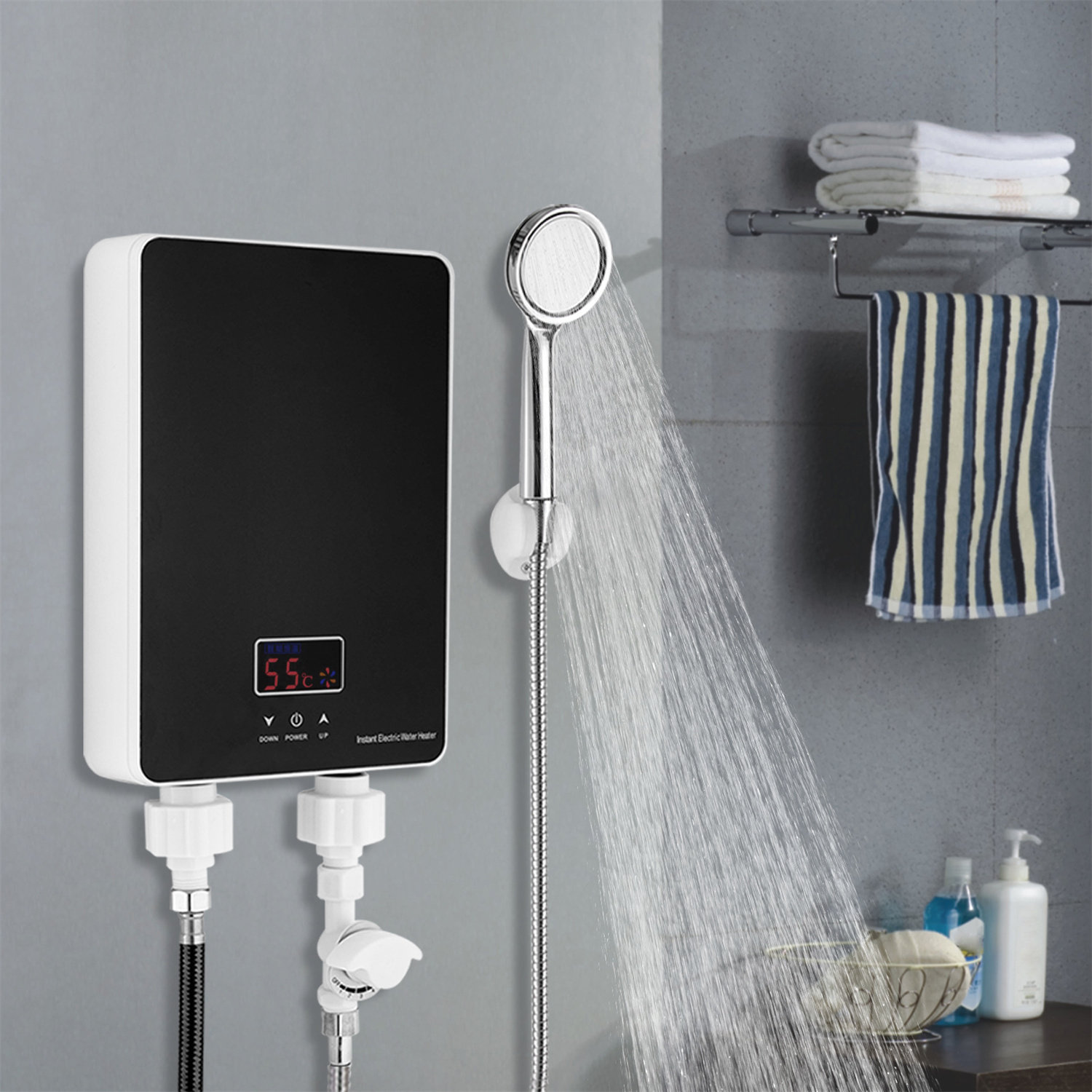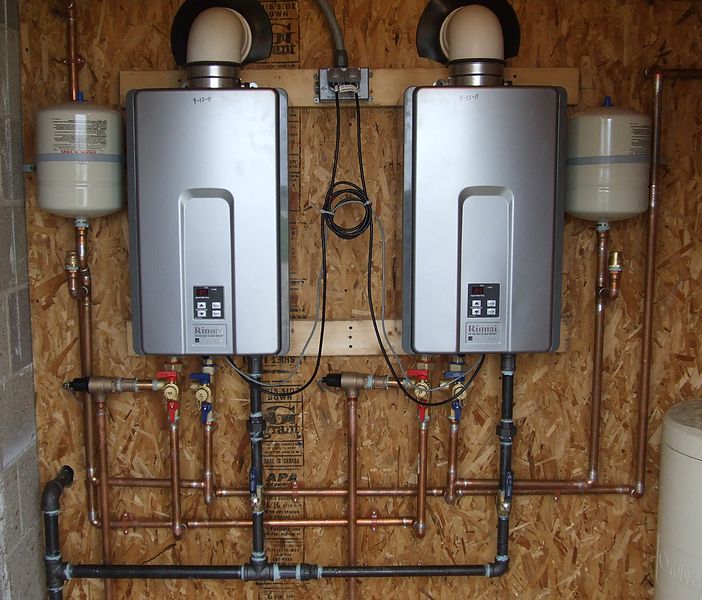Were you trying to find information and facts about Six Benefits of a Tankless Hot Water Heater?

In a globe where ease and effectiveness reign supreme, it's no surprise that home owners are constantly on the lookout for smarter means to manage their home's energy usage and convenience. One advancement that has actually steadily obtained appeal is the tankless water heater. However exactly what makes these systems stick out from the conventional tank-based models most of us grew up with? Allow's dive in and check out the benefits of tankless water heaters, assisting you determine if it's time to make the button in your home.
Introduction
Photo this: you step into the shower after a lengthy day, anticipating a calming cascade of hot water, only to be welcomed by icy droplets because the last person utilized everything up. Sound familiar? Conventional water heaters save a set amount of hot water, implying you're at the grace of that tank's supply. Tankless systems, on the other hand, warm water on demand. Say goodbye to running out mid-shower, say goodbye to wrestling with schedules simply to guarantee warm water is readily available.
Recognizing Tankless Water Heaters
What Are Tankless Hot Water Heater?
Tankless hot water heater, in some cases known as on-demand or instant water heaters, give warm water only as it's needed. As opposed to saving gallons of pre-heated water, these units kick right into action the moment you switch on the tap. Water passes through a warm exchanger, warming up in real-time, indicating you get a continuous flow of hot water without the requirement for a huge tank sitting idly by.
How Do They Differ from Standard Solutions?
Conventional heating systems hold a storage tank of hot water, making use of power to maintain that storage tank at a consistent temperature level. Tankless devices get rid of the standing supply, cutting down on lost energy and the cumbersome impact of a huge cylinder. Basically, you're upgrading from a "stockpile" way of thinking to a "made-to-order" method.
Usual Sorts Of Tankless Units
Tankless hot water heater usually are available in 2 selections: gas and electric. Gas models tend to provide greater circulation rates, ideal for larger homes, while electric models often serve smaller sized homes and are commonly much easier to mount. In addition, some systems are created for point-of-use (serving one component) while others can take care of the whole home's warm water requirements.
Key Benefits of Tankless Hot Water Heater
1. Unlimited Hot Water Supply
Ever before needed to arrange showers so everybody obtains their fair share of warm water? With tankless, that becomes a distant memory. As long as the heating unit's circulation capacity isn't gone beyond, you can take back-to-back showers without becoming a popsicle.
2. Power Efficiency and Expense Savings
No more heating a titan container's well worth of water and keeping it toasty all the time. Tankless heaters decrease standby energy losses, which can decrease utility costs. While the initial cost might be higher, the long-lasting cost savings frequently justify the investment.
3. Space-Saving Design
If your home is short on storage, eliminating the large storage tank frees up valuable space. Tankless systems are compact and can frequently be mounted on wall surfaces, concealed in edges, or set up in limited utility storage rooms without hogging the entire area.
4. Longer Life-span
A well-kept tankless water heater can outlive its tank-based cousin. Conventional tanks might last 10-15 years, while tankless designs can keep downing along for two decades or more, making them a strong investment over time.
5. Improved Water High Quality
Saving water in a tank can sometimes lead to debris build-up or a somewhat "off" taste. With tankless systems, fresh water is heated up instantly, reducing the chances of sediment build-up and potentially supplying cleaner-tasting water.
Considerations Prior To Switching
Though the benefits are compelling, it's wise to take into consideration a couple of aspects prior to fully dedicating.
Initial Financial Investment Expenses
Tankless heaters commonly come with a higher upfront price. Between the system itself and prospective installation adjustments, the first price might provide you sticker label shock. However remember to view it as a long-term investment.
Installment Demands
Depending on your home's framework, you may need extra electrical capacity or gas line upgrades. Ensure you understand the installment demands and consult with a professional to prevent surprises.
Reviewing Your Home's Water Usage Patterns
If your family concurrently utilizes numerous fixtures with high warm water demand, see to it the unit's flow rate fulfills your demands. Knowing your usage patterns aids you pick the right size and type of tankless heating unit.
Maintenance and Care Tips
Tankless systems are relatively low upkeep, however they aren't set-it-and-forget-it appliances.
Normal Cleaning and Descaling
Difficult water minerals can accumulate in the warm exchanger, impacting effectiveness. Normal descaling (typically suggested yearly) maintains the unit performing at peak performance.
Yearly Expert Evaluations
A yearly checkup from a professional makes sure small concerns are captured early. They'll evaluate the system's efficiency, look for leaks, and assist keep optimum performance.
Guaranteeing Appropriate Air Flow
For gas versions, proper ventilation is important to securely get rid of exhaust gases. Make sure airing vent systems are clean and appropriately set up to prevent any possible safety and security risks.
Comparing Different Brands and Models
Not all tankless hot water heater are developed equivalent.
Investigating Reliable Suppliers
Seek trustworthy brand names with a background of producing quality systems. A dependable manufacturer typically gives better customer support and longer service warranties.
Reviewing Reviews and Individual Responses
User evaluations and responses from neighbors or pals that have actually gone tankless can supply beneficial understandings. In some cases, real-life experiences can be much more telling than advertising sales brochures.
Setup: DIY or Professional?
While some property owners delight in tackling projects themselves, tankless installation could not be the best time to burst out the tool kit.
Pros and Cons of DIY Installation
A DIY mount can conserve money, but it includes risks. Incorrect setup can bring about inefficiency or safety and security worries. If you come in handy and have experience, it may be possible-- but proceed with caution.
When to Call a Professional Plumbing Technician
For a lot of, calling a pro makes sure every little thing's done correctly. A specialist plumber recognizes regional codes, sizing needs, and venting specifications, lowering the threat of problems.
Making best use of Performance
You have actually bought a tankless system-- now optimize its performance.
Ideal Temperature Level Setups
Lots of people establish their devices between 120-140 F. Adjusting the temperature level can boost convenience and financial savings. Experiment to discover a pleasant area that does not lose energy.
Pairing with Low-Flow Fixtures
Want to stretch your device's capacities? Consider installing low-flow showerheads and taps. They minimize water usage, enabling your tankless system to deliver a consistent stream of warm water without stressing.
Ecological Effect
Tankless water heaters straighten with greener living goals.
Lowered Carbon Footprint
By utilizing less energy and only home heating water as needed, tankless systems can decrease your home's carbon impact, decreasing your ecological impact.
Saving Natural Resources
Much less power consumption and much less thrown away hot water convert into fewer natural resources being utilized, an environmental win-win.
Who Profits Many from Tankless Heating systems?
The elegance of tankless heating units is that they can suit a selection of houses.
Big Family Members vs. Single Passengers
Large families might enjoy the limitless warm water supply, while single owners appreciate the energy financial savings from not heating a whole tank for simply someone's morning shower.
House Owners with Minimal Room
If your home is short on square footage, shedding the cumbersome tank liberates space for other essentials-- or possibly simply more breathing space.
Eco-Conscious Customers
Going tankless aligns with eco-friendly values, guaranteeing you're not throwing away power or sources.
Future Fads in Tankless Water Heaters
The world of home appliances is ever-evolving, and tankless water heaters are no exception.
Smart Home Integration
Picture readjusting your hot water heater's temperature level through an application or getting upkeep signals on your phone. As smart home technology breakthroughs, we'll see even more connectivity and benefit.
Improvements in Modern technology
R&D is constantly boosting heat exchangers, making units a lot more reliable and durable. Future designs could be also quieter, a lot more compact, and better matched for varying environments.
Conclusion
Selecting a tankless hot water heater is more than simply upgrading your home's warm water system; it's buying long-term comfort, power efficiency, and a greener lifestyle. By considering your home's water usage, being mindful of setup demands, and committing to routine maintenance, you can delight in a stable stream of warm water without the luggage of a bulky tank. As technology evolves, you can look forward to also smarter, extra efficient tankless options that not just make your life much easier but additionally benefit the earth.
Why You Should Consider a Tankless Water Heater for Your Home
Energy Efficiency and Cost Savings
Tankless water heaters, also known as on-demand water heaters, heat water only when needed. This means they don't waste energy keeping a tank of water hot constantly. This efficiency translates into substantial cost savings on your monthly energy bills.
Endless Hot Water Supply
One of the significant advantages of tankless water heaters is their ability to provide a continuous supply of hot water. Traditional tank water heaters have a limited capacity and can run out of hot water, especially during peak usage times. In contrast, tankless water heaters can provide an endless stream of hot water, making them ideal for larger families or homes with high water usage.
Space-Saving Design
Tankless water heaters are compact and take up significantly less space compared to traditional tank heaters. They can be installed on walls, under cabinets, or even outside, freeing up valuable space in your home. This makes tankless water heaters a great option for smaller homes or properties with limited space for a traditional water heater.
Longer Lifespan and Lower Maintenance
Tankless water heaters typically have a longer lifespan compared to traditional tank heaters. They can last up to 20 years or more with proper maintenance. Additionally, tankless systems are designed with replaceable parts, which can extend their lifespan further and reduce long-term maintenance costs.
Environmentally Friendly
Reducing energy consumption not only saves you money but also benefits the environment. Tankless water heaters contribute to a smaller carbon footprint by using less energy to heat water. Their energy efficiency and ability to minimize standby heat loss make them an eco-friendly choice for environmentally conscious homeowners.
Customized Temperature Control
Tankless water heaters offer precise temperature control, allowing you to set the desired temperature to meet your specific needs. This level of customization ensures you always have water at the perfect temperature for your comfort and usage requirements.
https://beantownservices.com/blog/consider-tankless-water-heater-for-your-home

Do you enjoy reading up on Pros and Cons of Tankless Water Heater? Leave a review directly below. We would be happy to listen to your views about this posting. Hoping to see you back again in the near future. Sharing is nice. Helping people is fun. Many thanks for your time. Kindly visit our site back soon.
Call Today